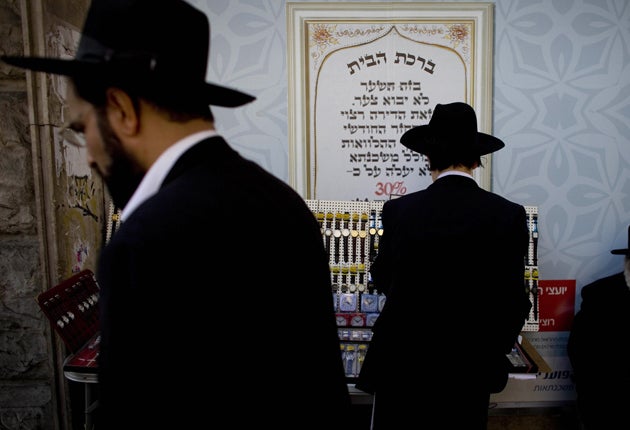In The House Of Ishmael: A history Of The Jews In Muslim Land, By Martin Gilbert

The subtitle to Martin Gilbert's new book (his 81st?) is a little misleading. This is not really a general account of the fortunes and misfortunes of Jews under Muslim rule from the seventh century until the present day. The early centuries are rushed through and, although Gilbert is aware of the magnificent and fabulously detailed account of Jewish life in medieval Egypt provided by SD Goitein's five-volume A Mediterranean Society, he makes little use of it.
Similarly, though Gilbert quotes Bernard Lewis once, he has made surprisingly scant use of Lewis's brilliant articles on the Jews under Turkish rule, which drew both on Hebrew sources and the Ottoman archives. Lewis's The Jews of Islam (1984) remains the best, most balanced and accessible account of the Jews under Muslim rule.
By contrast In the House of Ishmael reads more like a bill of indictment than a history. It is overwhelmingly focused on the sufferings of the Jews in the Islamic lands in the 20th and 21st centuries in the wake of the foundation of the Zionist movement, the establishment of Israel and the successive victories of Israel over Arab armies. The indictment is damning indeed.
From Afghanistan to Morocco, Jews were made to suffer for the successes of Zionism. They were humiliated, robbed, raped, imprisoned, tortured and killed. In Iraq and elsewhere there were mass hangings of innocent Jews. For one Iraqi Jew driven out by pogroms of the 1940s this was "a tragedy which turned out to be a blessing in disguise – it got us out of that dreadful country and away from its destructive, treacherous and savage people".
Gilbert makes use of copious anecdotal evidence and statistics to chronicle a shameful side of Arab and Islamic history. In the aftermath of the creation of Israel, 726,000 Palestinian Arabs were made refugees, while 850,000 Jews had to abandon their homes in the Arab lands. With some difficulty, Israel succeeded in assimilating most of the Jewish refugees. By contrast, the Palestinian refugees still languish in crowded camps. The paradox is that violent Arab racism and paranoia helped populate Israel.
Gilbert has so much material and such a strong case that it should not have been necessary to stack the deck. Yet it seems to me that he has done so and his use of sources is sometimes questionable. For his account of how the Jews in 13th-century Basra were forced to wear clothing that marked their lower status he cites a Jewish traveller, Jacob of Ancona, who allegedly travelled from Italy to China. But when in 1997 the purported narrative of Jacob's travels was published by David Selbourne as The City of Light, the Sinologists Jonathan Spence and Tim Barrett, the Jewish historians David and Bernard Wasserstein and myself all challenged the authenticity of the text. Since then no original manuscript has turned up. It would have been safer to have relied on Goitein's material.
Gilbert's notes cite Bat Ye'or with approval several times. When, in 2002, her book Islam and Dhimmitude: Where Civilizations Collide appeared, I reviewed it and then threw the book away. Bat Ye'or is not an academic and her books are poorly ordered assemblages of facts, real or alleged, that relentlessly show Islam and Arabs in an unfavourable light.
She believes that there is an Islamic conspiracy to turn Europe into something she calls "Eurabia". Those interested to get a fuller sense of the dementedly Islamophobic polemics of this woman should consult the website www.loonwatch.com.
When Gilbert discusses what was happening in Palestine during the British mandate, he quotes Joan Peters's From Time Immemorial: The Origins of the Arab-Jewish Conflict over Palestine to back up his assertion that more Arabs than Jews entered Palestine as immigrants in the 1930s. But when that book was published in 1984, critics swiftly demonstrated that its use of archives and statistics was seriously flawed and substantially misleading. Yehoshua Porath, professor of Middle East History at the Hebrew University of Jerusalem, denounced the book as "sheer forgery".
Israel can be seen as the salvation of the Jews of the Middle East, but it can also be seen as their curse. One Iraqi Jewish woman confessed that she "nursed a grudge. I felt that all the horrible things that were happening to us were because of Israel, because of your dream and your wars. You celebrated the victories, and we paid the price of those wars. Now I can see that we were saved because of the existence and efforts of Israel".
In the House of Ishmael, full of vivid accounts of Jewish sufferings in the Middle East, did not need the testimony of false friends to pad its grim story out. Its account of the slow-burning tragedy of the extinction of Jewish communities in the Arab world is moving and important. It should be read.
Robert Irwin's 'For Lust of Knowing: The Orientalists and Their Enemies' is published by Penguin
Join our commenting forum
Join thought-provoking conversations, follow other Independent readers and see their replies
Comments